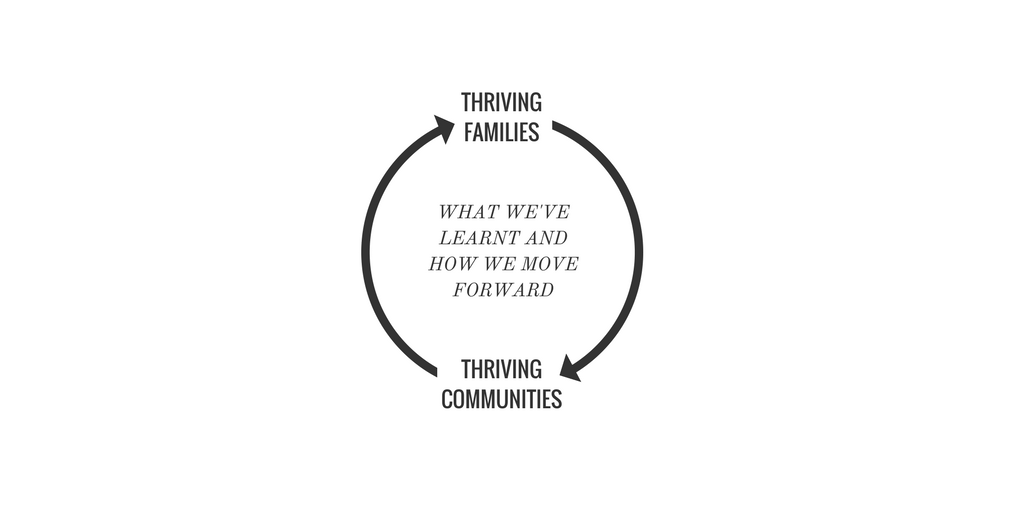
Strong relationships as the golden thread in thriving societies
blog | 03 Nov 2016
We all know that relationships matter. We are social beings. Our quality of life, indeed our happiness, is directly related to the degree to which we feel connected to others.
A look at the role of social worker as relationship-builder
By Lizzie Insall – Programme Lead (Local Public Services), Innovation Unit & Carmen Colomina – Practice Development Manager, SCIE
In the past few days, Lyn Romeo, Chief Social Worker for Adults, has talked in her blog about social work now being given the ‘recognition it deserves’. She argues that it is the way in which social workers engage with families, and the relationships they build, which are now being more highly valued:
‘This recognition is built on our understanding of people, their families and the environments within which they live, our values and human rights, strengths based practice, working alongside people to enable them to have better lives’.
We all know that relationships matter. We are social beings. Our quality of life, indeed our happiness, is directly related to the degree to which we feel connected to others, we share experiences and can rely on people who care about us for support.
If you needed convincing by hard evidence, then it’s available in abundance. The research on the importance of relationships is clear: healthy relationships are a vital component of health and well-being. There is a good deal of compelling evidence that strong relationships contribute to a long, healthy, and happy life and that, conversely, the health risks from being alone or isolated are comparable to the risks associated with cigarette smoking, blood pressure, and obesity. The Grant Study, undertaken by Harvard researchers, followed the lives of a cohort of men over 75 years. When it concluded, the researchers declared an overwhelming and important, but simple finding: relationships are key to a happy life. Those men who were satisfied in their relationships were all round happier and healthier human beings.
Lyn also used her blog, which was published as the sector prepares for the NCAS conference later this week, to announce the Named Social Worker pilot, which Innovation Unit, in partnership with the Social Care Institute for Excellence, is helping to deliver. The pilot gives six local authorities funding and support to allocate a named social worker for adults with autism, learning disabilities and mental health issues.
Ultimately, Named Social Worker is about creating the space for purposeful and empowering relationship building, built on a deep understanding of individual need and capacity.
Providing a dedicated caseworker who has an ongoing responsibility for an individual’s support means they can be the primary point of contact for care and treatment, and can use their professional voice to challenge across the system and advocate on the individual’s behalf, linking with a range of services, professionals and organisations. Whilst the pilot does not sanction any new powers for social workers, it gives us a chance to understanding how to change the experiences and outcomes for people with autism, learning disabilities and mental health issues by introducing a new set of relationships.
Our involvement in this programme, in partnership with the Social Care Institute for Excellence, provides us with an opportunity to learn more about how to change practice in public policy. We look forward to working with the pilot areas as they pilot different approaches to the Named Social Worker model over the next six months, supporting them to articulate and assess the impact of their approach on outcomes for individuals, and bringing them together to share their experiences and learn from one another. As ever, we’ll be sharing insights and evidence along the way.
At Innovation Unit we create new solutions for thriving communities: solutions which build, support and recognise human potential and the critical importance of thriving relationships — within families, between individuals, and across personal and professional boundaries.
And when it comes to creating thriving families, we know that it’s not just relationships within those families that matter. Where families need support, the quality of the relationships they have with public service professionals, like social workers, is also a deal breaker. Research from the Harvard Centre for Developing Child has found that the single most important factor in the success of any intervention is the quality of the relationship between a professional and a family.
Innovation Unit related work:
We are working as part of the Spring Consortium on the Children’s Social Care Innovation Fund. 53 projects are identifying enablers and barriers to innovation which raise questions for the sector about how new approaches in children’s social care can be best developed and supported.
Read more about our ideas and work on thriving families in our recent blog: Thriving families need thriving communities, and vice versa: a big lesson from ‘Troubled Families’
SCIE related work: